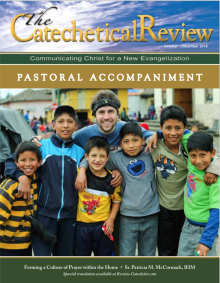This article is the first of a two-part discussion of an area of critical importance for those working in any ministry setting—clergy or laity—whose interactions with others require mentoring skills, evangelical hospitality, ongoing pastoral interactions in the course of catechetical work, small group facilitation, parenting, nurturing, and intercessory prayer outreach. This first article addresses pastoral accompaniment’s fundamental relation to good catechetics. The second article will explore practical and creative ways to implement such formation in ministry settings. “I never look at the masses as my responsibility; I look at the individual. I can only love one person at a time, just one, one, one… So you begin. I began – I picked up one person. Maybe if I didn't pick up that one person, I wouldn't have picked up forty-two thousand… The same thing goes for you, the same thing in your family, the same thing in your church, your community. Just begin – one, one, one.” ~ St. Teresa of Calcutta Did the early Church have emails, blogs, social websites, EWTN, publishing powerhouses that provided pamphlets, holy cards, books, CDs, DVDs, or even Bibles? Did the early Church have parish bulletins, flyers, posters, handouts, parishioner mailings, media racks, certified catechists, great circuit speakers from afar, even DREs? Did the early Church have lovely vestments, soaring art, beautiful baptismal fonts, gilded altars, glowing monstrances, well-designed hymnals, even church buildings? Did the early Church have devotional societies, knights, sodalities, bazaars, spaghetti dinners, golf tournaments, vacation Bible schools, elementary schools with professionally printed textbooks, private colleges filled with faithful professors, or even bingo? Did the early Church have highly developed devotional traditions, a calendar full of feast days, a liturgy that organizes Christ’s life for us, or even offertory envelopes? The point is not that any of this is in any way bad. The point is that the Church grew by leaps and bounds without any of it. All of that good stuff can be a huge help, but none of it can make up for the lack of people that seek to “pick up just one,” and not count the cost. What did the early Church have? 1) Apostles, 2) the first generation of bishops and priests and deacons, 3) a laity made up of people who were discipled in such a way that following Jesus and sharing Jesus were indistinguishable, 4) martyrs at all social levels and ages. All of this was made possible by two factors: people who lived as other Christs and sacramental grace to lift that witness beyond human weakness. St. Paul is frequently invoked as a person who would use all the modern forms of reaching out if they were available to him, but this would never replace him being sacrificially present to souls. Do you and I prioritize that?
The rest of this online article is available for current Guild members.
This article is from The Catechetical Review (Online Edition ISSN 2379-6324) and may be copied for catechetical purposes only. It may not be reprinted in another published work without the permission of The Catechetical Review by contacting [email protected]


















